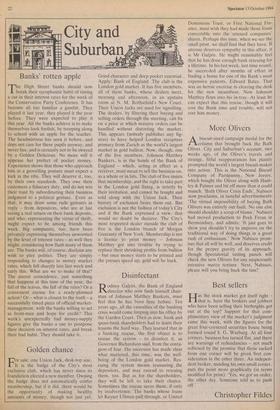City and
Banks' rotten apple
The High Street banks should now break their sycophantic habit of timing a cut in their interest rates for the week of the Conservative Party Conference. It has become all too familiar a gambit. They played it last year, they played it the year before. They were expected to play it this year. All the banks achieve is to make themselves look foolish, by trooping along to school with an apple for the teacher. The headmistress has seen it before, and does not care for these pupils anyway, and never has, and is certainly not to be swayed by a Golden Delicious. No more will it appease her prefect of pocket money. Experience shows that those who approach him in a grovelling posture must expect a kick in the ribs. They will deserve it, too, by their own standards. They owe their customers a fiduciary duty, and do not win their trust by subordinating their business judgment to a political gesture. Even as that, it may draw some rude gestures in reply — from depositors, who are at last seeing a real return on their bank deposits, and who, representing the virtue of thrift, might expect to be among friends this week. Big companies, too, have been privately expressing themselves unworried by the level of interest rates — as well they might, considering how flush many of them are. The banks will, of course, disclaim any wish to play politics. They are simply responding to changes in money market rates, which fell sharply late last week and early this. What are we to make of that? The purest coincidence, just something that happens at this time of the year, the fall of the leaves, the fall of the rates? Or a convenient excuse for a ready-planned action? Or — what is closest to the truth — a successfully timed piece of official market- management, with the banks willing to act as front-men and hope for credit? This week's unexpectedly bad money-supply figures give the banks a cue to postpone their decision on interest rates, and break their bad habit. They should take it.






















































 Previous page
Previous page